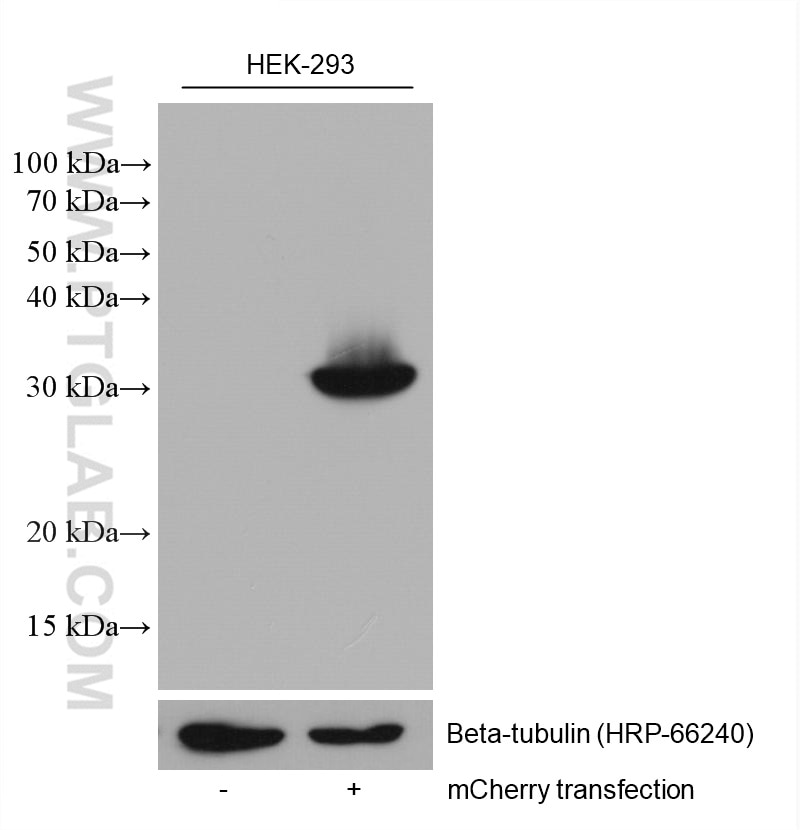mCherry Monoklonaler Antikörper
mCherry Monoklonal Antikörper für WB, ELISA
Wirt / Isotyp
Maus / IgG1
Getestete Reaktivität
rekombinanten Protein und mehr (1)
Anwendung
WB, IP, IF, ELISA
Konjugation
Unkonjugiert
CloneNo.
1B3C6
Kat-Nr. : 68088-1-Ig
Synonyme
Galerie der Validierungsdaten
Geprüfte Anwendungen
| Erfolgreiche Detektion in WB | HEK-293-Zellen |
Empfohlene Verdünnung
| Anwendung | Verdünnung |
|---|---|
| Western Blot (WB) | WB : 1:2000-1:10000 |
| It is recommended that this reagent should be titrated in each testing system to obtain optimal results. | |
| Sample-dependent, check data in validation data gallery | |
Veröffentlichte Anwendungen
| WB | See 1 publications below |
| IF | See 1 publications below |
| IP | See 1 publications below |
Produktinformation
68088-1-Ig bindet in WB, IP, IF, ELISA mCherry und zeigt Reaktivität mit rekombinanten Protein
| Getestete Reaktivität | rekombinanten Protein |
| In Publikationen genannte Reaktivität | human |
| Wirt / Isotyp | Maus / IgG1 |
| Klonalität | Monoklonal |
| Typ | Antikörper |
| Immunogen | mCherry fusion protein Ag25320 |
| Vollständiger Name | mCherry |
| Berechnetes Molekulargewicht | 27 kDa |
| Gene symbol | |
| Gene ID (NCBI) | |
| Konjugation | Unkonjugiert |
| Form | Liquid |
| Reinigungsmethode | Protein-G-Reinigung |
| Lagerungspuffer | PBS mit 0.02% Natriumazid und 50% Glycerin pH 7.3. |
| Lagerungsbedingungen | Bei -20℃ lagern. Aliquotieren ist bei -20oC Lagerung nicht notwendig. 20ul Größen enthalten 0,1% BSA. |
Hintergrundinformationen
mCherry is a fluorophore (a fluorescent protein) used in biotechnology as a tracer to follow the flow of fluids, as a marker when tagged to molecules and cell components. mCherry is the second generation monomeric red fluorescent protein that have improved brightness and photostability. mCherry and the majority of red fluorescent proteins derive from a protein isolated from Discosoma sp. mCherry is a monomeric fluorescent construct with peak absorption/emission at 587 nm and 610 nm, respectively.
Protokolle
| Produktspezifische Protokolle | |
|---|---|
| WB protocol for mCherry antibody 68088-1-Ig | Protokoll herunterladen |
| Standard-Protokolle | |
|---|---|
| Klicken Sie hier, um unsere Standardprotokolle anzuzeigen |
Publikationen
| Species | Application | Title |
|---|---|---|
J Biol Chem Porcine IKKε is involved in the STING-induced type I IFN antiviral response of the cytosolic DNA signaling pathway |


